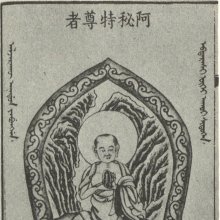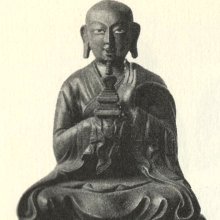Abheda: 15 definitions
Introduction:
Abheda means something in Buddhism, Pali, Hinduism, Sanskrit, Marathi, Hindi. If you want to know the exact meaning, history, etymology or English translation of this term then check out the descriptions on this page. Add your comment or reference to a book if you want to contribute to this summary article.
Alternative spellings of this word include Abhed.
Images (photo gallery)
In Hinduism
Mīmāṃsā (school of philosophy)
Source: Srimatham: Mīmāṃsa: The Study of Hindu ExegesisAbheda (अभेद) refers to category of declaration on Brahman and Ātman.—Abheda-śruti refers to those affirming identity between Atman and Brahman.

Mimamsa (मीमांसा, mīmāṃsā) refers to one of the six orthodox Hindu schools of philosophy, emphasizing the nature of dharma and the philosophy of language. The literature in this school is also known for its in-depth study of ritual actions and social duties.
In Buddhism
Mahayana (major branch of Buddhism)
Source: academia.edu: A Study and Translation of the GaganagañjaparipṛcchāAbheda (अभेद) refers to the “absence of distinction”, according to the Gaganagañjaparipṛcchā: the eighth chapter of the Mahāsaṃnipāta (a collection of Mahāyāna Buddhist Sūtras).—Accordingly, as Gaganagañja said to Ratnapāṇi: “Son of good family, those sixty-four dharmas are included in one hundred twenty-eight dharmas. What are those one hundred twenty-four? [...] (17) protecting oneself is included in not performing any evil deed and accumulating all merits; (18) protecting others is included in tolerance and gentleness; (19) the absence of distinction (abheda) is included in the space-like thoughts and the wind-like thoughts; (20) a single taste is included in suchness and the absolute truth; [...]’”.

Mahayana (महायान, mahāyāna) is a major branch of Buddhism focusing on the path of a Bodhisattva (spiritual aspirants/ enlightened beings). Extant literature is vast and primarely composed in the Sanskrit language. There are many sūtras of which some of the earliest are the various Prajñāpāramitā sūtras.
Languages of India and abroad
Marathi-English dictionary
Source: DDSA: The Molesworth Marathi and English Dictionaryabhēda (अभेद).—a (S) Undivided: also indivisible.
--- OR ---
abhēda (अभेद).—m (S) Want or absence of difference; identity, oneness, unity: also unity of views and feelings and pursuits. 2 or abhēdabhāva m (S) or abhē- damata n The doctrine of the identity of the universe and the Deity; or of the identity of the human soul and the Divine essence; pantheism.
Source: DDSA: The Aryabhusan school dictionary, Marathi-Englishabhēda (अभेद).—a Undivided. m Want of difference, identitty, oneness, unity.
Marathi is an Indo-European language having over 70 million native speakers people in (predominantly) Maharashtra India. Marathi, like many other Indo-Aryan languages, evolved from early forms of Prakrit, which itself is a subset of Sanskrit, one of the most ancient languages of the world.
Sanskrit dictionary
Source: DDSA: The practical Sanskrit-English dictionaryAbheda (अभेद).—a.
1) Undivided.
2) Identical, same, alike; तयोरभेदप्रतिपत्तिरस्ति मे (tayorabhedapratipattirasti me) Bhartṛhari 3. v. l.
-daḥ 1 Absence of difference or distinction, identity, sameness;
2) unity, oneness; भेदाभेदयोर्भेदो ग्रहीतव्यः (bhedābhedayorbhedo grahītavyaḥ) | ŚB. on MS.1.6.3. तद्रूपकमभेदो य उपमानोपमेययोः (tadrūpakamabhedo ya upamānopameyayoḥ) K. P.1, Śiśupālavadha 13.25.
3) Close union; इच्छतां सह वधूभिरभेदम् (icchatāṃ saha vadhūbhirabhedam) Kirātārjunīya 9.13. अभेदेन च युध्येत रक्षेच्चैव परस्परम् (abhedena ca yudhyeta rakṣeccaiva parasparam) H.3.72; आशास्महे विग्रहयोरभेदम् (āśāsmahe vigrahayorabhedam) Bhartṛhari 1.24.
Source: Cologne Digital Sanskrit Dictionaries: Shabda-Sagara Sanskrit-English DictionaryAbheda (अभेद).—m.
(-daḥ) Identity, absence of difference or distinction. mfn.
(-daḥ-dā-daṃ) Alike, identical. E. a neg. bheda distinction.
Source: Cologne Digital Sanskrit Dictionaries: Benfey Sanskrit-English DictionaryAbheda (अभेद).—m. undividedness, [Hitopadeśa] iii. [distich] 79.
Abheda is a Sanskrit compound consisting of the terms a and bheda (भेद).
Source: Cologne Digital Sanskrit Dictionaries: Cappeller Sanskrit-English DictionaryAbheda (अभेद).—[adjective] not different, identical; [masculine] undividedness, sameness, identity.
Source: Cologne Digital Sanskrit Dictionaries: Monier-Williams Sanskrit-English Dictionary1) Abheda (अभेद):—[=a-bheda] m. non-fracture, compactness, closeness of array, [Ṛgveda-prātiśākhya] etc.
2) [v.s. ...] absence of difference or distinction, identity
3) [v.s. ...] mfn. not different, identical, [Viṣṇu-purāṇa]
Source: Cologne Digital Sanskrit Dictionaries: Goldstücker Sanskrit-English DictionaryAbheda (अभेद):—I. [tatpurusha compound] m.
(-daḥ) 1) Undividedness, close union; e. g. Hitop.: abhedena ca yudhyeyū rakṣeyuśca parasparam; or Bhartṛh. Śriṅgāraś.: adarśane darśanamātrakāmā dṛṣṭā pariṣvaṅgarasaikalolā . āliṅgitāyāṃ punarāyatākṣyāmāśāsmahe vigrahayorabhedam.
2) Sameness, identity; e. g. Kaiyy. (on Patanj. to Pāṇ. I. 1. 9.): spṛṣṭatādyabhedādvivārādibhedepi yathā bhavati tathā spṛṣṭatādibhedepi vivārādyabhedātprāpnotīti praśnaḥ; or Bharatas. on Bhaṭṭik. 1. 21.: kṣatriyatvaṃ brāhmaṇatvaṃ cānyonyaprayojanakaṃ jātivyaktyorabhedopacārāt.—The term is of frequent occurrence in philosophical works; e. g. Viśvan. on a Nyāya S.: guṇaguṇinorabhedo na; or Sāṅkhya Prav.: āñjasyādabhedato vā guṇasāmānyādestatsiddhiḥ pradhānavyapadeśādvā; or Sāṅkhya Tattwak.: adhyavasāyo buddhiḥ . kriyākriyāvatorabhedavivakṣayā…buddheḥ yodhyavasāyo buddherasādhāraṇavyāpārastadabhedā buddhiḥ. In the Vedānta abheda is especially applied to the identity of the universal and individual soul or of the Deity and the world; e. g. Vedāntasāra: anayorvyaṣṭisamaṣṭyorvanavṛkṣayoriva jalāśayajalayoriva cābhedaḥ . etadupahitayorīśvaraprājñayorapi vanavṛkṣāvacchinnākāśayoriva jalāśayajalagatapratibimbākāśayoriva cābhedaḥ. This view of identity is refuted by the Nyāya-Vaiś.; e. g. in this passage of the Siddhāntamukt.: satyaṃ jñānamiti brahmaparaṃ jīveṣu nopayujyate jñānājñānasukhitvaduḥkhitvādibhirjīvānāṃ bhedasiddhau sutarāmīśvarabhedaḥ (ed. Calc. 1827; the reading ºśvarābhedaḥ in Dr. Röer's ed. seems a misprint) . anyathā bandhamokṣānupapatteḥ . yopīśvarabhedabodhako vedaḥ sopi tadabhedena tadīyatvaṃ pratipādayaṃstauti . abhedabhāvane ca yatitavyamiti vadati . ata eva sarva eva ātmani samarpitāḥ śrūyante . mokṣadaśāyāmajñānanivṛttāvabhedo jāyata ityapi na . bhedasya nityatvena nāśāyogāt . bhedanāśe pi vyaktidvayaṃ sthāsyatyeva. E. a neg. and bheda. Ii. [bahuvrihi compound] m. f. n.
(-daḥ-dā-dam) 1) Undivided, closely joined; e. g. Siddhāntamukt.: karmadhārayasthale tu nīlotpalamityādāvabhedasaṃbandhena nīlapadārtha utpalapadārthe prakāraḥ . na ca tatra lakṣaṇā. [
2) Identical.] E. a priv. and bheda.
Source: Cologne Digital Sanskrit Dictionaries: Yates Sanskrit-English DictionaryAbheda (अभेद):—[a-bheda] (daḥ) 1. m. Identity.
[Sanskrit to German]
Sanskrit, also spelled संस्कृतम् (saṃskṛtam), is an ancient language of India commonly seen as the grandmother of the Indo-European language family (even English!). Closely allied with Prakrit and Pali, Sanskrit is more exhaustive in both grammar and terms and has the most extensive collection of literature in the world, greatly surpassing its sister-languages Greek and Latin.
Hindi dictionary
Source: DDSA: A practical Hindi-English dictionaryAbheda (अभेद) [Also spelled abhed]:—(nm) identity, oneness; hence ~[tā] (nf).
...
Kannada-English dictionary
Source: Alar: Kannada-English corpusAbhēda (ಅಭೇದ):—[adjective] not different; identical.
--- OR ---
Abhēda (ಅಭೇದ):—
1) [noun] absence of difference; perfect identity; oneness; sameness.
2) [noun] the quality or state of being united in opinion; unanimity.
3) [noun] (phil.) absence of difference between the phenomenal world and the Supreme Soul.
Kannada is a Dravidian language (as opposed to the Indo-European language family) mainly spoken in the southwestern region of India.
See also (Relevant definitions)
Starts with: Abhedabhakti, Abhedaikatvasamkhya, Abhedajayashri, Abhedaka, Abhedakarika, Abhedakhandana, Abhedamandana, Abhedamithyatvanirupana, Abhedanvaya, Abhedarupaka, Abhedasamsarga, Abhedashruti, Abhedatmate, Abhedavada, Abhedavadi.
Ends with (+172): Abhiprayabheda, Abhrabheda, Acarabheda, Acharabheda, Achintya Bheda Abheda, Adharabheda, Ahankarabheda, Akkharapabheda, Akshabheda, Amtahprabheda, Amtaraprabheda, Amtargatabheda, Amtimaprabheda, Anandabheda, Angabheda, Anyonyabheda, Ardhabheda, Ardhavabheda, Arthabheda, Ashmabheda.
Full-text (+6): Abhedin, Abhedavada, Abhedavadi, Svarupaprapti, Abhedya, Abhed, Acintyabhedabhedatattva, Ashvatthabheda, Abhedyata, Abhedaka, Abhedyatva, Achintya Bheda Abheda, Shuddhavidyatattva, Atmarama, Vrittyaniyamaka, Tryambaka, Rupaka, Amardaka, Samsarge, Vishishta Advaita.
Relevant text
Search found 46 books and stories containing Abheda, Abhēda, A-bheda; (plurals include: Abhedas, Abhēdas, bhedas). You can also click to the full overview containing English textual excerpts. Below are direct links for the most relevant articles:
Rig Veda (translation and commentary) (by H. H. Wilson)
Rig Veda 10.28.9 < [Sukta 28]
Srila Gurudeva (The Supreme Treasure) (by Swami Bhaktivedanta Madhava Maharaja)
Viṣṇu-tattva as stated by Śrī Madhvācārya < [Chapter 1.5 - Back to Home Village]
Vakyapadiya of Bhartrihari (by K. A. Subramania Iyer)
Verse 1.45 < [Book 1 - Brahma-kāṇḍa (or Āgama-samuccaya)]
Verse 2.101 < [Book 2 - Vākya-kāṇḍa]
Verse 2.102 < [Book 2 - Vākya-kāṇḍa]
Sahitya-kaumudi by Baladeva Vidyabhushana (by Gaurapada Dāsa)
Text 10.231 < [Chapter 10 - Ornaments of Meaning]
Text 11.47 [Pariṇāma] < [Chapter 11 - Additional Ornaments]
Text 10.53 < [Chapter 10 - Ornaments of Meaning]
Shrimad Bhagavad-gita (by Narayana Gosvami)
Verse 13.14 < [Chapter 13 - Prakṛti-puruṣa-vibhāga-yoga]
Foreword (to the Hindi edition)
Verse 18.54 < [Chapter 18 - Mokṣa-yoga (the Yoga of Liberation)]
Tattvartha Sutra (with commentary) (by Vijay K. Jain)
Verse 5.2 - Classification of substances (dravya) < [Chapter 5 - The Non-living Substances]
Related products

